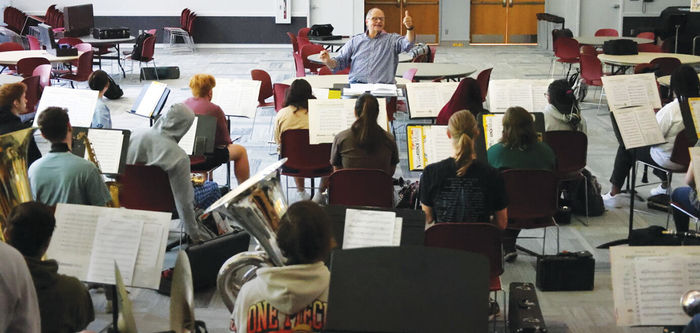In a world that can feel deeply divided, there is one thing that every culture on every continent has in common—music.
“It’s like magic,” said Jim Dowds, case manager in Penn State Behrend’s Personal Counseling Center. “Music has been found in some form in every nation throughout history. Singing. Dancing. Drumming. It’s all musical.”
This universal appreciation of music, in whatever form it takes, helps us connect—with others and with ourselves.
“From listening to dancing to playing an instrument, the deeper you get involved in music, the more that it can help you,” said Dowds, who plays drums for The Groove, a popular Erie dance band, in his free time.
Dowds often encourages students to pursue musical hobbies as a form of stress relief.
“College is hard, and students need a place to escape, to be creative, to play, and to have fun,” he said. “And getting involved in some form of music is a good way to find friends who share your interests.”
Fortunately, students at Behrend who want to scratch that musical itch have a lot of options.
“Students can perform in our ensembles, which include concert band, pep band, jazz ensemble, and choir,” said Dr. Joel Hunt, associate teaching professor of music. “They can take courses on a variety of music topics, such as electronic music, jazz history, music theory, The Beatles, and music production. They can even complete a Music Technology minor.”
A professional saxophone player, Hunt also plays drums, guitar, piano, flute, and clarinet, and is currently learning the oboe. He is also immersed in the digital musical genre as well, playing modular synthesizers and composing interactive computer music.
“I’ve been evenly split between electronic and acoustic music worlds,” he said. “I teach electronic music production and the history of electronic music, but I also teach music theory and jazz history. It’s all the same to me.”
In addition to courses and programs, Behrend offers further opportunities to engage with music, including musical theatre, a drumline club, an a capella club, and a club that creates and presents electronic musical concerts on campus.
And, for those who may not want to commit to a group or club, Behrend’s Personal Counseling Office offers weekly drop-in drum circles and sound meditations to promote improved mental health and wellness through music. (For schedules, students can follow the office on instagram.com/psbcounseling.)
“Musical activities are more than a creative or artistic outlet,” said Dr. Gary Viebranz, teaching professor of music and director of instrumental ensembles. “Students in our musical groups have a valuable resource in the other members who can answer a lot of questions, help them navigate college, and provide friendship.”
